Filter by
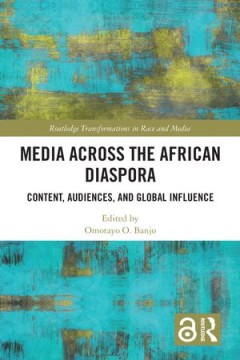
Media Across the African Diaspora Content, Audiences, and Influence
This volume gathers scholarship from varying disciplinary perspectives to explore media owned or created by members of the African diaspora, examine its relationship with diasporic audiences, and consider its impact on mainstream culture in general. Contributors highlight creations and contributions of people of the African diaspora, the interconnections of Black American and African-centered m…
- Edition
- -
- ISBN/ISSN
- 9781351660204, 1351660209
- Collation
- -
- Series Title
- -
- Call Number
- -

Inside the Canberra Press Gallery: Life in the Wedding Cake of Old Parliament…
Before television, radio, and later the internet came to dominate the coverage of Australian politics, the Canberra Press Gallery existed in a world far removed from today’s 24-hour news cycle, spin doctors and carefully scripted sound bites. This historical memoir of a career reporting from The Wedding Cake of Old Parliament House offers a rare insider’s perspective on both how the gallery…
- Edition
- -
- ISBN/ISSN
- 9781921862373
- Collation
- -
- Series Title
- -
- Call Number
- 320 CHA i
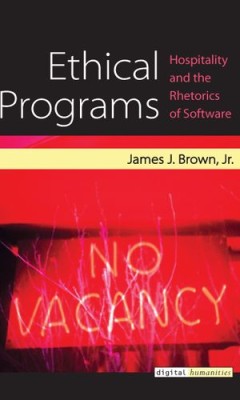
Ethical Programs; Hospitality and the Rhetorics of Software
Living in a networked world means never really getting to decide in any thoroughgoing way who or what enters your “space” (your laptop, your iPhone, your thermostat . . . your home).
- Edition
- -
- ISBN/ISSN
- 9780472900084
- Collation
- -
- Series Title
- -
- Call Number
- T 371.358 BRO e

Art, Research, Philosophy
Art, Research, Philosophy explores the emergent field of artistic research: art produced as a contribution to knowledge. As a new subject, it raises several questions: What is art-as-research? Don’t the requirements of research amount to an imposition on the artistic process that dilutes the power of art? How can something subjective become objective? What is the relationship between art and …
- Edition
- -
- ISBN/ISSN
- 9781317654827
- Collation
- -
- Series Title
- -
- Call Number
- 302.23 CAZ a
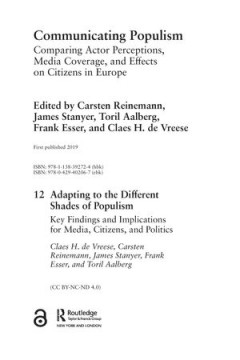
12 Adapting to the Different Shades of Populism
The purpose of this concluding chapter is two-fold. On the one hand, we want to tease out and summarize the key fi ndings of the diff erent chapters. What do these studies tell us, collectively? On the other hand, we want to extrapolate from these fi ndings and the current literature to off er concrete stakeholder advice to politicians, journalists, and citizens who are all confronted with the …
- Edition
- -
- ISBN/ISSN
- 9781138392724
- Collation
- -
- Series Title
- -
- Call Number
- 302.23 STA t

'This in-Between': How Families Talk About Death in Relation To Severe Brain …
Thanatological research in the social sciences and the humanities acknowledges that death is culturally and socially embedded. The idea of the social construction of death has been taken on board, albeit slowly, by the social and cultural study of death, but explicit reflections on the underlying ontologies and epistemologies of this paradigm remain scarce. This edited volume aims to strengthen…
- Edition
- -
- ISBN/ISSN
- 9781137391902
- Collation
- -
- Series Title
- -
- Call Number
- 302.23 BRU t

Contesting Religion
As Scandinavian societies experience increased ethno-religious diversity, their Christian-Lutheran heritage and strong traditions of welfare and solidarity are being challenged and contested. This book explores conflicts related to religion as they play out in public broadcasting, social media, local civic settings, and schools. It examines how the mediatization of these controversies influence…
- Edition
- -
- ISBN/ISSN
- 9783110502060
- Collation
- -
- Series Title
- -
- Call Number
- -
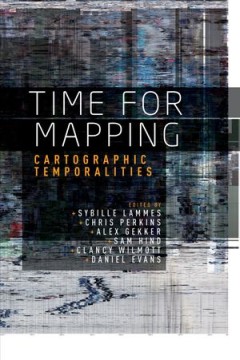
Time for mapping
"The digital era has brought about huge transformations in the map itself, which to date have been largely conceptualised in spatial terms. Novel objects, forms, processes and approaches have emerged and pose new, pressing questions about the temporality of digital maps and contemporary mapping practices: in spite of its implicit spatiality, digital mapping is strongly grounded in time. This co…
- Edition
- -
- ISBN/ISSN
- 9781526122520
- Collation
- -
- Series Title
- -
- Call Number
- -

Technical politics Andrew Feenberg’s critical theory of technology
This is the first monograph devoted to the work of one of the foremost contemporary advocates of contemporary critical theory, Andrew Feenberg. It focuses on Feenberg’s central concept, technical politics, and explores his suggestion that democratising technology design is key to a strategic understanding of the process of civilisational change. In this way, it presents Feenberg’s intervent…
- Edition
- -
- ISBN/ISSN
- 9781526105349
- Collation
- -
- Series Title
- -
- Call Number
- -
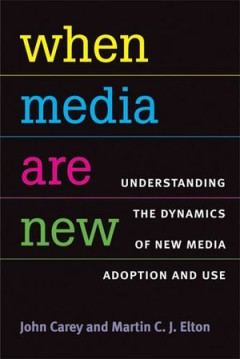
When Media Are New: Understanding the Dynamics of New Media Adoption and Use
The world of communication media has undergone massive changes since the mid-1980s. Along with the extraordinary progress in technological capability, it has experienced stunning decreases in costs; a revolutionary opening up of markets (a phenomenon exemplified by but not limited to the rise of the Internet); the advent of new business models; and a striking acceleration in the rate of change.…
- Edition
- -
- ISBN/ISSN
- 9780472900411
- Collation
- -
- Series Title
- -
- Call Number
- 302.231 CAR w
 Computer Science, Information & General Works
Computer Science, Information & General Works  Philosophy & Psychology
Philosophy & Psychology  Religion
Religion  Social Sciences
Social Sciences  Language
Language  Pure Science
Pure Science  Applied Sciences
Applied Sciences  Art & Recreation
Art & Recreation  Literature
Literature  History & Geography
History & Geography